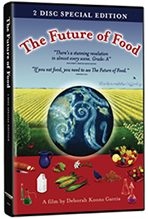The Future of Food: Difference between revisions
Removing proposed deletion - This doc is getting a lot of coverage - Deletion is not cleanup |
Adam Cuerden (talk | contribs) Nominate for deletion. |
||
| Line 1: | Line 1: | ||
<!-- Please do not remove or change this AfD message until the issue is settled --> |
|||
{{Article for deletion/dated|page=The Future of Food|timestamp=20151227164623|year=2015|month=December|day=27|substed=yes}} |
|||
<!-- Once discussion is closed, please place on talk page: {{Old AfD multi|page=The Future of Food|date=27 December 2015|result='''keep'''}} --> |
|||
<!-- End of AfD message, feel free to edit beyond this point --> |
|||
{{unreferenced|date=November 2012 }} |
{{unreferenced|date=November 2012 }} |
||
{{POV|date=February 2015}} |
{{POV|date=February 2015}} |
||
Revision as of 16:46, 27 December 2015
An editor has nominated this article for deletion. You are welcome to participate in the deletion discussion, which will decide whether or not to retain it. |
| The Future of Food | |
|---|---|
 DVD cover of The Future of Food' | |
| Directed by | Deborah Koons Garcia |
| Written by | Deborah Koons Garcia |
| Produced by | Deborah Koons Garcia Catherine Butler |
| Distributed by | Lily Films |
Release date | May 30, 2004 |
Running time | 88 minutes |
| Country | United States |
| Language | English |
The Future of Food is a 2004 American documentary film which describes an investigation into unlabeled, patented, genetically engineered foods that have been sold in grocery stores in the United States for the past decade. In addition to the US, there is a focus on Canada and Mexico.
It voices the opinions of farmers in disagreement with the food industry, and details the impacts on their lives and livelihoods from this new technology, and the market and political forces that are changing what people eat. The farmers state that they are held legally responsible for their crops being invaded by "company-owned" genes. The film generally opposes the patenting of living organisms, and describes the disappearance of traditional cultural practices.
The film criticizes the cost of a globalised food industry on human lives around the world. It states that international companies are gradually driving farmers off their land in many countries, that monoculture farming might lead to global dependence of the human race on food corporations, and that there is an increased risk of ecological disasters caused by a reduction of biological diversity. For example, the local varieties of Mexican corn are being replaced by subsidized US corn.
It describes a fear of major losses to local food systems and states that these gene banks will no longer be available to save global industrial agriculture when a new pest arises, and that terminator genes could lead to a widespread catastrophe affecting the food supply, if they spread to plants in the wild. Legal stories reported by the film related how a number of farmers in North America have been sued by the Monsanto Company.
The film was written and directed by Deborah Koons Garcia, produced by Catherine Butler and Koons Garcia, and premiered on September 14, 2005 at Film Forum in New York City to a full house. It has since been released on DVD in both NTSC and PAL formats.
See also
- Animal, Vegetable, Miracle: A Year of Food Life
- Deconstructing Dinner
- The Jungle
- A Place at the Table
- Food, Inc.
External links
- Official website
- Official trailer
- The Future of Food / O Futuro da Comida (YouTube)
- The Future of Food at IMDb
- The Future of Food at AllMovie
- The Future of Food at Rotten Tomatoes
- The Future of Food at Metacritic
- The Future of Food at Box Office Mojo
